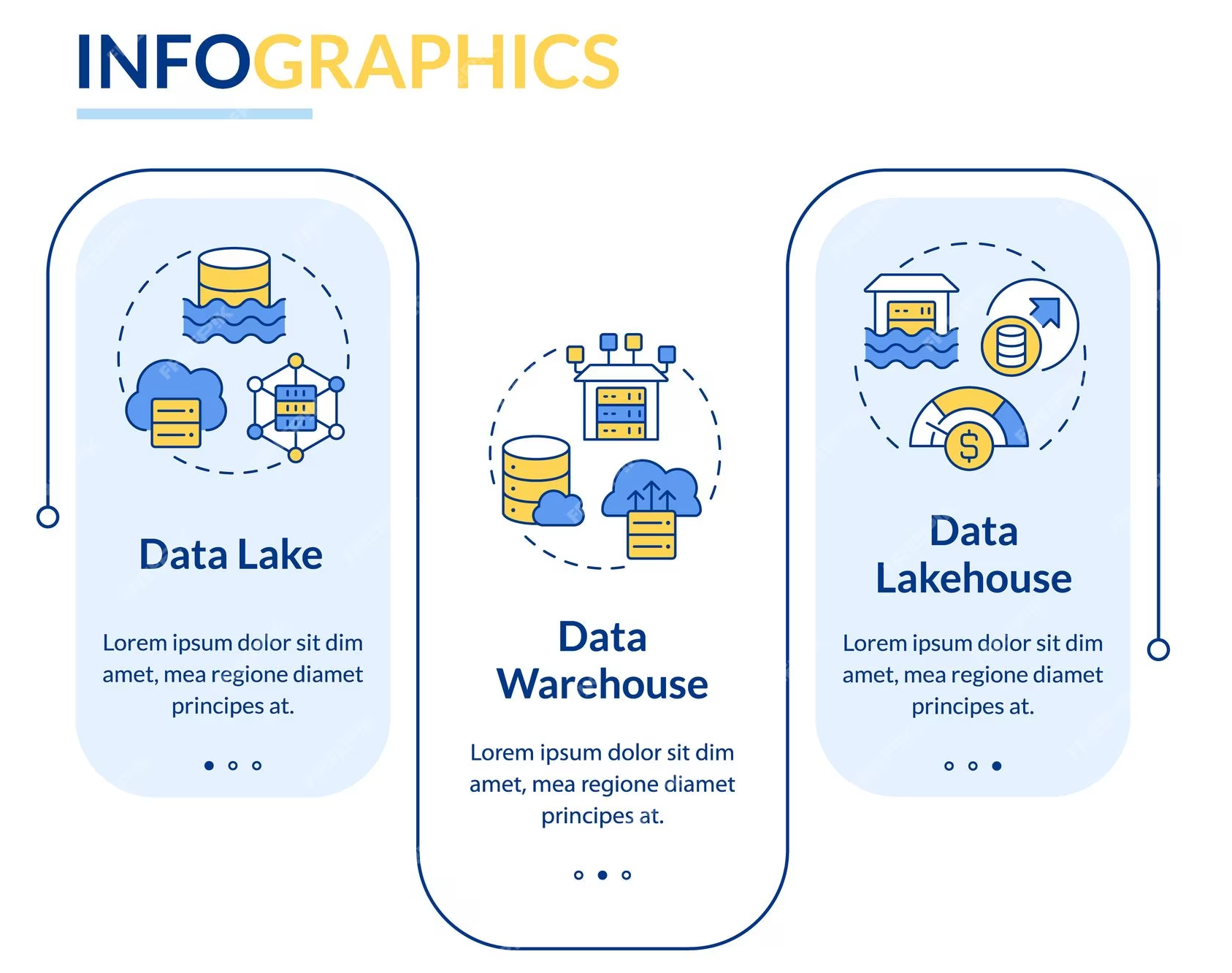Image Source: FreeImages
In today’s data-driven world, businesses rely on data to make critical decisions, improve products and services, and gain a competitive edge. With the exponential growth of data, it has become essential for companies to implement effective data storage solutions that can handle large volumes of information and enable quick data analysis.
Two widely used data storage architectures for big data are data warehouses and data lakes. However, a new player has entered the scene – the data lakehouse. In this article, we will explore the differences between data warehouses, data lakes, and data lakehouses, and help you understand which solution is the most suitable for your business needs.
What is a Data Warehouse?
A data warehouse is a centralized repository that stores large amounts of structured data from various sources within an organization. It serves as a single source of “data truth” and is specifically designed for online analytical processing (OLAP). Data warehouses extract, transform, and load (ETL) data from multiple sources, ensuring data consistency and quality.
Data warehouses are optimized for complex queries and analysis, making them ideal for business intelligence and decision-making purposes. They provide a structured and standardized format for data, enabling users to easily access and analyze information using business intelligence tools and SQL clients.
One of the key advantages of a data warehouse is its ability to improve data standardization, quality, and consistency. By consolidating data from different sources into a consistent format, organizations can rely on the data for their business needs. Data warehouses also enhance the overall decision-making process by providing a single repository of current and historical data.
However, data warehouses have some limitations. They can be expensive to implement and maintain, especially as data volumes continue to grow. Additionally, data warehouses are primarily designed for structured data and may struggle with unstructured or semi-structured data formats.
What is a Data Lake?
A data lake is a flexible and scalable storage repository that stores large amounts of structured, semi-structured, and unstructured data in its raw form. Unlike data warehouses, data lakes do not enforce a predefined schema at the time of data ingestion. Instead, data is stored in its original format and processed later for analysis purposes.
Data lakes are typically stored on object storage systems such as Amazon S3, Google Cloud Storage, or Azure Data Lake Storage. They provide a cost-effective solution for storing data at scale and offer the flexibility to accommodate various data types, including IoT data, social media data, and streaming data.
The key advantage of a data lake is its ability to store vast amounts of data in its raw form, allowing for future data use cases and providing data flexibility. Data lakes also support a wide variety of data science and machine learning use cases, making them popular among data scientists and analysts.
However, data lakes also have their limitations. They can suffer from poor data reliability and security due to the lack of data consistency. Additionally, if not properly managed, data lakes can become disorganized, making it challenging to connect them with business intelligence and analytics tools.
What is a Data Lakehouse?
A data lakehouse is a relatively new data storage architecture that combines the best features of both data warehouses and data lakes. It serves as a unified platform for data warehousing and data lakes, offering the flexibility of a data lake and the reliability and consistency of a data warehouse.
In a data lakehouse, all types of data – structured, semi-structured, and unstructured – are stored in a data lake without any processing. The data can then be processed using various tools and technologies to build specific use cases. The data lakehouse architecture ensures data integrity and consistency through ACID (Atomicity, Consistency, Isolation, Durability) transaction support, similar to traditional data warehouses.
One of the key advantages of a data lakehouse is reduced data redundancy. By providing a single platform for all data storage needs, data duplication is minimized, reducing storage costs and simplifying data management. Data lakehouses also offer better data governance and security, making it easier to implement robust data security policies.
Data lakehouses support a wide range of workloads, including data analytics, business intelligence, and machine learning. They provide direct access to popular business intelligence tools, such as Tableau and PowerBI, and support open-data formats, such as Parquet, for easy integration with machine learning libraries.
However, it’s important to note that data lakehouses are still a relatively new technology, and their maturity and best practices are yet to be fully established. While they offer the benefits of both data warehouses and data lakes, it’s essential to assess your specific business needs and evaluate whether a data lakehouse is the right solution for you.
Data Warehouse vs. Data Lake vs. Data Lakehouse: A Quick Comparison
To summarize the differences between data warehouses, data lakes, and data lakehouses, let’s take a quick look at their key characteristics:
| Data Storage Solution | Key Features |
|---|---|
| Data Warehouse | – Centralized repository for structured data – Optimized for complex queries and analysis – Improved data standardization and quality – Suitable for business intelligence and decision-making |
| Data Lake | – Flexible storage for structured, semi-structured, and unstructured data – Stores data in its raw form – Supports a wide range of data science and machine learning use cases – Cost-effective and scalable solution |
| Data Lakehouse | – Unified platform for data warehousing and data lakes – Supports structured, semi-structured, and unstructured data – Offers ACID transaction support for data integrity – Reduces data redundancy and improves data governance |
Choosing the Right Data Storage Solution
When it comes to choosing the right data storage solution for your business, there is no one-size-fits-all approach. The choice between a data warehouse, data lake, or data lakehouse depends on various factors, including the type of data you’re dealing with, your specific use cases, and your organization’s needs and resources.
If your business primarily deals with structured data and requires robust and performant analytics capabilities, a data warehouse might be the best fit. Data warehouses provide a structured and standardized environment for data analysis and are well-suited for business intelligence and decision-making purposes.
On the other hand, if your organization deals with diverse data types and requires flexibility and scalability, a data lake could be the right choice. Data lakes allow you to store raw data in its original format, providing the flexibility to process and analyze data as needed. They are particularly useful for data science and machine learning use cases.
If you’re looking for a solution that combines the benefits of both data warehouses and data lakes, a data lakehouse might be worth considering. Data lakehouses offer a unified platform for data storage, processing, and analytics, providing the flexibility and scalability of a data lake and the reliability and consistency of a data warehouse.
Ultimately, the decision should be based on a thorough assessment of your organization’s specific requirements and goals. It’s essential to consider factors such as data types, performance needs, cost considerations, and the expertise and resources available within your organization.
Conclusion
In the ever-evolving landscape of data storage solutions, data warehouses, data lakes, and data lakehouses play vital roles in managing and analyzing large volumes of data. Each solution offers unique benefits and features, catering to different business needs and use cases.
Data warehouses provide a structured and optimized environment for business intelligence and decision-making, while data lakes offer flexibility and scalability for diverse data types and data science use cases. Data lakehouses, on the other hand, combine the best of both worlds, providing a unified platform for data warehousing and data lakes.
When choosing the right data storage solution for your organization, it’s crucial to evaluate your specific requirements carefully, considering factors such as data types, performance needs, cost considerations, and the expertise available within your organization. By selecting the most suitable solution, you can unlock the full potential of your data and drive informed decision-making and business growth.
About RTS Labs
RTS Labs is an industry leader in providing future-proof, customer-focused business software solutions across the board. Our number one priority is to satisfy our customers’ expanding needs. As a company, we separate ourselves from the competition thanks to our strong product expertise, our familiarity with complex company processes, and our ability to apply that knowledge across projects. Our goal is to complete every project on schedule and to the client’s complete satisfaction.
Contact us for a free consultation and discover how Data Lakehouses can transform your data management strategy.






